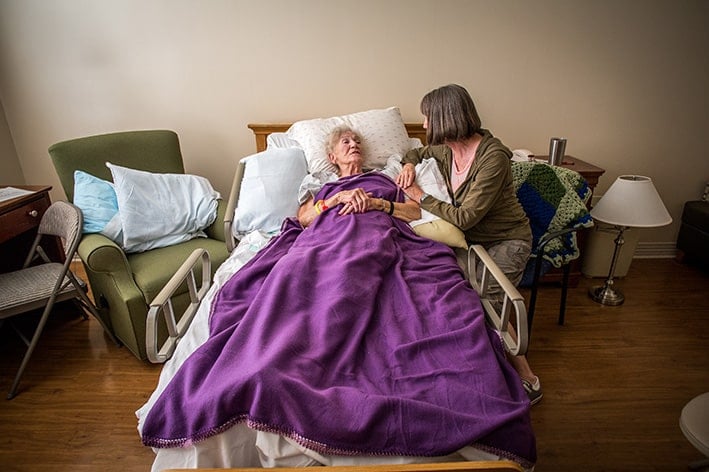
As euthanasia laws take effect around the nation, Sydney grant aids research into the effects of legalised killing on increasingly precarious palliative care
Research into the effect of euthanasia laws on palliative care in Australia has been supported with a $100,000 grant from the Catholic Archdiocese of Sydney.
At a time when many state parliaments have implemented laws legalising euthanasia, Archbishop Anthony Fisher OP awarded the grant to a team led by Associate Professor Natasha Michael, Director of Palliative Medicine, Cabrini Health and University of Notre Dame, Australia; Professor David Kissane, AC, Chair of Palliative Care Research, University of Notre Dame, Australia and The Cunningham Centre at St Vincent’s Hospital in Sydney and Professor David Jones, Director of the Anscombe Bioethics Centre, Oxford, UK.
The research is being led in Victoria and Western Australia where Voluntary Assisted Dying (VAD) legislation has been in place since 2019 and 2020 respectively, and will investigate the impact of euthanasia and physician-assisted suicide on the quality of care delivered by Catholic Palliative Care services and their partners.
Archbishop Fisher applauded the work being done by the three academics and other researchers in Australia into pro-life medical research.
“I am delighted that the grant will support research into the quality of palliative and other care provided to people at the end of their lives,” he said.
“The research is timely. As more Australian jurisdictions sadly go down the path of euthanasia and assisted suicide, it is more important than ever for Catholic institutions to offer good and dignified alternatives to those diagnosed with terminal illness.
“I am confident the research will bear good fruit and assist our Catholic hospitals and aged care facilities to continue their long history of caring for the sick and vulnerable, even – and especially – when governments abandon their duty to do so.”
I’m confident the research will … assist our Catholic hospitals to continue caring for the sick and vulnerable, even – and especially – when governments abandon their duty to do so.”
Archbishop Anthony Fisher OP
Associate Prof Michael said their research will provide pivotal information into how Catholic institutions continue to commit to their ethic of care in the face of new legislation. She said the team would explore data qualitatively, quantitatively, and through an ethical lens in compliance with the Code of Ethical Standards for Catholic Health and Aged Care Services in Australia.
“All of our organisations share a distinct ethic of care founded on the inviolable dignity of every human person,” she said.
“We are now faced with the challenging questions of how our ethical commitments can be reaffirmed in the context of legislation, what it means to continue to accompany and care for someone who may be pursuing VAD or wishes to do so, and what the effects of the legislation are on the care we offer, our caregivers and the broader community.
“Our research is led by leading experts in palliative care, psychiatry and bioethics with strong academic track records from the University of Notre Dame, the Anscombe Bioethics Centre, the Plunkett Centre for Ethics and collaborating sites meeting the highest international standard of scientific excellence.
“Our research is also innovative as it will be the first time such work is undertaken internationally by a collaboration of organisations that express conscientious objection to VAD legislation.”
Euthanasia and assisted suicide laws are currently operating in Victoria and WA.
They have also passed the South Australian, Tasmanian and Queensland parliaments and will likely begin to operate in those jurisdictions next year.
Victoria recorded 325 deaths in its first two years of operation while WA have recorded 50 deaths in its first six months.

Euthanasia and assisted suicide laws have also passed the NSW Lower House.
The Legislative Council committee will report back to the Upper House on 22 February, after which it’s expected a debate and vote will take place.
The grant is the tenth for medical research awarded by the Archdiocese since 2003.
Previously, it could only be used for research involving the therapeutic use of adult stem cells, however this year it was extended to other pro-life medical research including investigating medical approaches to assisting infertile couples, medical treatments conducted on babies in-utero, and palliative care treatments at all stages of life with a focus on pain management.
The 2020 winner, Dr Carmine Gentile, a biomedical engineer from the University of Technology Sydney, used three-dimensional bio-printing of replacement heart patches, as well as adult stem cells, to support patients suffering from heart failure.
Praising the safety of adult stem cells, he told The Catholic Weekly that, “besides serious ethical issues concerning the use of embryonic stem cells, there is also a serious risk that the embryonic cell could be rejected by the patient’s body.”
The 2015 award recipient, Professor Nick Di Girolamo from the School of Medical Sciences at the University of NSW, said the archdiocese’s grant supported his research on treatments for corneal disease.
He said the grant helped him obtain preliminary research data, which in turn helped him secure further funding from the National Health and Medical Research Council of Australia and the U.S. Department of Defence.
Related Articles:
